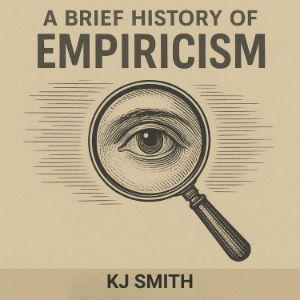

A Brief History of Empiricism
KJ Smith
This audiobook is narrated by a digital voice.
A Brief History of Empiricism traces the development of one of philosophy's most influential theories of knowledge, exploring how the radical idea that all knowledge comes from sensory experience revolutionized human understanding. From its ancient origins in Aristotelian thought to its systematic formulation by British philosophers John Locke, George Berkeley, and David Hume, this book examines how empiricism challenged centuries of rationalist philosophy that privileged innate ideas and pure reason. Author [Your Name] skillfully guides readers through the evolution of empiricist thought, showing how Locke's concept of the mind as a "blank slate," Berkeley's idealism, and Hume's skeptical insights about causation fundamentally transformed debates about perception, reality, and the limits of human knowledge.
The book demonstrates how empiricist principles became the foundation of modern scientific methodology, influencing everything from experimental design to evidence-based medicine and social research. Through accessible explanations of key concepts like induction, observation, and verification, readers discover how empiricism shaped the Scientific Revolution and continues to underpin contemporary approaches to knowledge acquisition across disciplines. Whether you're a student of philosophy, science, or anyone curious about how we know what we know, this engaging exploration reveals why empiricism remains central to modern intellectual life, offering insights into the ongoing tension between experience and theory that defines much of human inquiry and discovery.
Duration - 1h 15m.
Author - KJ Smith.
Narrator - Digital Voice Madison G.
Published Date - Friday, 31 January 2025.
Copyright - © 2025 Ashleigh Robertson ©.
Location:
United States
Networks:
KJ Smith
Digital Voice Madison G
A Brief History of - Philosophy
Ashleigh Robertson
English Audiobooks
Findaway Audiobooks
Description:
This audiobook is narrated by a digital voice. A Brief History of Empiricism traces the development of one of philosophy's most influential theories of knowledge, exploring how the radical idea that all knowledge comes from sensory experience revolutionized human understanding. From its ancient origins in Aristotelian thought to its systematic formulation by British philosophers John Locke, George Berkeley, and David Hume, this book examines how empiricism challenged centuries of rationalist philosophy that privileged innate ideas and pure reason. Author [Your Name] skillfully guides readers through the evolution of empiricist thought, showing how Locke's concept of the mind as a "blank slate," Berkeley's idealism, and Hume's skeptical insights about causation fundamentally transformed debates about perception, reality, and the limits of human knowledge. The book demonstrates how empiricist principles became the foundation of modern scientific methodology, influencing everything from experimental design to evidence-based medicine and social research. Through accessible explanations of key concepts like induction, observation, and verification, readers discover how empiricism shaped the Scientific Revolution and continues to underpin contemporary approaches to knowledge acquisition across disciplines. Whether you're a student of philosophy, science, or anyone curious about how we know what we know, this engaging exploration reveals why empiricism remains central to modern intellectual life, offering insights into the ongoing tension between experience and theory that defines much of human inquiry and discovery. Duration - 1h 15m. Author - KJ Smith. Narrator - Digital Voice Madison G. Published Date - Friday, 31 January 2025. Copyright - © 2025 Ashleigh Robertson ©.
Language:
English
INTRODUCTION
Duration:00:06:07
EMPIRICISM IN ANCIENT PHILOSOPHY
Duration:00:06:17
MEDIEVAL AND ISLAMIC CONTRIBUTIONS TO EMPIRICISM
Duration:00:07:44
THE RISE OF EMPIRICISM IN THE EARLY MODERN PERIOD
Duration:00:08:47
EMPIRICISM AND THE SCIENTIFIC REVOLUTION
Duration:00:09:58
EMPIRICISM IN THE 19TH AND 20TH CENTURIES
Duration:00:10:38
EMPIRICISM AND THE EMPIRICAL REALISM
Duration:00:10:14
THE FUTURE OF EMPIRICISM
Duration:00:10:30
CONCLUSION
Duration:00:05:30